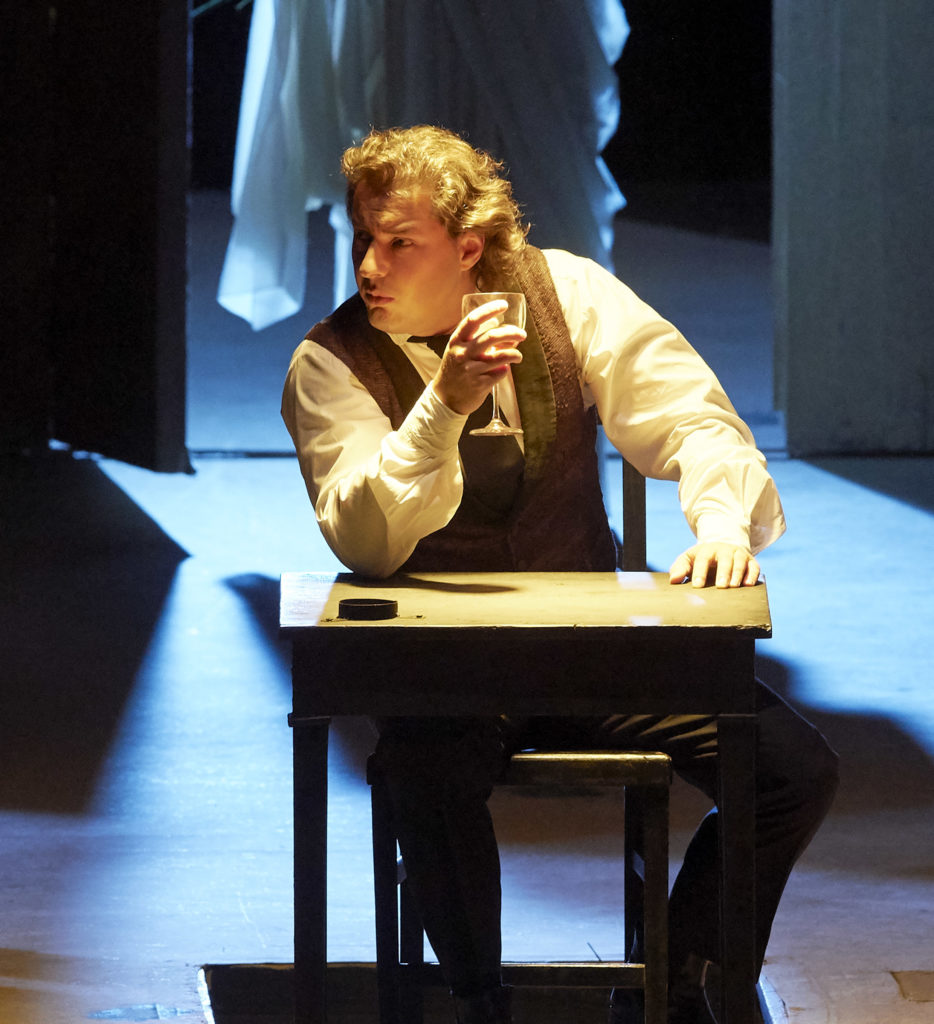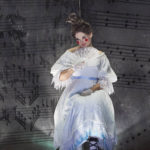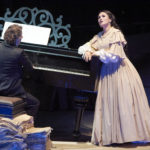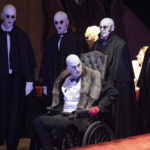 Hoffmann is ‘a poet and man who never drinks water.’ Dmitry Korchak is sitting at his desk, centre-stage, surrounded by papers, but with a quill. His ‘Muse’ Gaëlle Arquez, ravishing in white, like a goddess, swears to protect him from from the dangers of love. So Arquez cross-dresses, as the student Nicklausse, who shadows him in every scene (putting up with her irritable, often abusive master.) Arquez’s pretty-sounding lyric mezzo is a joy.
Hoffmann is ‘a poet and man who never drinks water.’ Dmitry Korchak is sitting at his desk, centre-stage, surrounded by papers, but with a quill. His ‘Muse’ Gaëlle Arquez, ravishing in white, like a goddess, swears to protect him from from the dangers of love. So Arquez cross-dresses, as the student Nicklausse, who shadows him in every scene (putting up with her irritable, often abusive master.) Arquez’s pretty-sounding lyric mezzo is a joy.
Councillor Lindorf (Luca Pisaroni) appears as the villain, Hoffmann’s antagonist, who thwarts him from the beginning, intercepting a letter from Stella, Hoffmann’s obsession. Lindorf, with money and power, is Hoffmann’s diabolical opposite, his super-ego. Reading the letter, he mocks Hoffmann, the poet’s power to conquer women’s souls, turn others green with envy. Not he. Conspiratorial in a dark military coat, Pisaroni’s richly coloured baritone also sings the other demonic roles (Dr.Miracle, Dapertutto), out to get Hoffmann, as if paranoid creations of his imagination.
We’ are at a tavern – a wine cellar, with Hoffmann’s student friends knocking back tankards of beer. They sing, they’ll empty Luther’s cellar! Hoffmann, arriving with Nicklausse, has to sing the drinking song about the dwarf Kleinzack (politically incorrect, but humorous.) Korchak, standing on the tables, has a terrific, lyrical tenor with enormous power in reserve. Also convincing in portraying the tormented poet, here in the Keinzack song, his mind wanders into describing a mysterious beauty. The students demand Hoffmann reveal the name of the mistress: he answers, there are three, Olympia, Antonia, and Giuletta. (But they’re really different versions of his ideal.)
Vienna State Opera’s stage curtain, with its smudged manuscript, crossed-out revisions, and doodles, is raised to reveal a Frankenstein’s studio. In Richard Hudson’s fantastical set, there are all sorts of weird musical contraptions, including various organ grinders. She’ll recoup the money he lost in a dodgy investment. But ‘Oympia’ is an automaton: a robot. (How modern, she’s got Artificial Intelligence!) ‘If only we could make love together, share our hopes,’ he sings. Hoffmann is in love with her. Wait till you know her better, boasts the not-so-mad scientist.
 Olympia (Olga Peretyatko) is like a made-up doll. Peretyatko, with a high coloratura soprano, miraculously produces a ‘mechanical doll-like sound’. Even more astonishing, Peretyatko also sings the other roles: the ‘operatic’ part of Antonia, as well as the seductively erotic Giulietta (Act 3). In Olympia’s Song, she sings of the birds in the meadow (Les oiseaux) speaking to a girl in love. Red bulbs light up. Peryatko’s Olympia is a puppet figure in white chiffon, rouged cheeks, waving a white fan in the glass vitrine, above which sits the top-hatted Spalanzani. (Rows of medical students linE the gallery above.)
Olympia (Olga Peretyatko) is like a made-up doll. Peretyatko, with a high coloratura soprano, miraculously produces a ‘mechanical doll-like sound’. Even more astonishing, Peretyatko also sings the other roles: the ‘operatic’ part of Antonia, as well as the seductively erotic Giulietta (Act 3). In Olympia’s Song, she sings of the birds in the meadow (Les oiseaux) speaking to a girl in love. Red bulbs light up. Peryatko’s Olympia is a puppet figure in white chiffon, rouged cheeks, waving a white fan in the glass vitrine, above which sits the top-hatted Spalanzani. (Rows of medical students linE the gallery above.)
Alone with Olympia, Hoffmann professes his love, in his aria. Incredibly Olympia comes alive, appearing almost human, with feminine gestures. But after they sing ‘their hearts blazing in unison’, she disappears! Spalanzani tries to control his ‘daughter’, but she kicks him; then frees herself from her restrainers. And collapses, as if her batteries have run down. Olympia is taken away and dismantled. Another ‘automaton’ is brought on, and Hoffmann, disconsolate, realises he’s been duped. We see poor Korchak gloomily holding an arm.
In Act 2, Antonia is seated at a piano singing ‘The faithful turtle dove has flown…’ But no ordinary grand piano, surreal, stretches the length of the stage; there are portholes, side panels, with ladies peering out; and a wind-up gramophone.
Sublimely sung – Offenbach’s gorgeous melody – here Peretyatko’s soprano is fragile. Antonia the atypical ‘Victorian’ Romantic heroine, enfeebled, suffering from some incurable disease. A 19th Century gender stereotype, the woman afflicted by emotional longeur, or hysteria. The possessive father Crespel (bass Dan Paul Dumitresco) will let no-one in, resenting the visiting ‘fiancé’ Hoffmann.
But Hoffmann’s come while the old man is out. ‘A long song floats…’ in Antonia’s aria. She will be his wife. (Not that simple!) Let us be faithful in love…’ more Romantic sentimentality. ‘You’ll not forbid me to sing, like my father!, she declaims, Peretyatko’s soprano now climbing staggering runs of coloratura. (Now that sweet song they used to sing.) It’s all done so convincingly, but isn’t Offenbach being tongue-in-cheek? Anyway these two are so damned good, they sing it straight and carry it off. Then she collapses.
There arrives Dr. Miracle. Guess who, Luca Pisaroni, ‘disguised’ in black, his hair long and greying, like a wizard. His assistants, white-haired, wearing top-hats, carry a huge syringe, aiming it like a harpoon. Problematically (for us) there’s a child medium. The so-called doctor urges Antonia – What a sacrifice- to renounce conventional married life for her singing career. (The spirit of her mother is conjured up- died of a fatal illness, now inherited by Antonia.) Zoryana Kushpler, wearing a diamonté gown -donning a tiara- is carrying a bunch of red flowers. The diva’s come-back is ‘surreal’; and Antonia faints, left a crumpled figure. But, like Violetta, ‘Our Lady of the Flowers’, Antonia’s on her feet. ‘It is a love song ‘ she starts to sing. And collapses inevitably.
Huge, imposing baroque chandeliers. The extended stage with its ‘gondolas’ resembles a Venetian pageant – high walls on each side, spectators looking down on the regatta.
A diva, in scarlet-red bodice, approaches, sailing in on a float. But it’s the Muse Arquez with her arms around her waist. There are liveried servants in red velvet, courtesans in white taffeta lounging at the ‘quays’; all to the strains of the barcarole. Just divine!
‘There is nothing to keep me here. Must one cower at the feet of beauty?’ Bitterly, Korchak’s Hoffmann laments, ‘The happiness of love lasts but a day.’ Korchak drags Giuelletta and pulls her into his arms.
Now the Diable-like Dapertutto, escorted in a wheelchair, his face ghostly white. His keepers/minders, in black, wear gold-rimmed dark glasses- like those for a Papal dignitary. In his aria, Pisaroni, ‘Beautiful diamond, cast your spell on them!’
His keepers/minders, in black, wear gold-rimmed dark glasses- like those for a Papal dignitary. In his aria, Pisaroni, ‘Beautiful diamond, cast your spell on them!’
Peretyatko, in tight, sleeveless, scarlet top, white lace skirt- sexy! She’s contriving her own scheme. Oh, poor man, are you leaving. You’ll offend me if you leave like this! Korchak responds, how his sweet soul is filled with rapture. He feels her perfumed breath. But the devilish Dapertutto in his wheelchair, waving, fingering his huge diamond, reminds us she’s a bought woman.
She wants his image. She wants Hoffmann’s reflection! (His reflection symbolises his identity as an artist.) What madness, he replies.
The plot goes haywire; but it is, anyway, a lurid fantasy, product of the poet’s subconscious imagination. The Muse pleads ‘Let us flee before you lose your soul; Korchak is on his knees, his head in turmoil. Peretyako’s Giulietta, is playing with that diamond. Hoffmann is involved in a sword fight, apparently kills the man-in-the-white-suit. Dapertutto teasingly plays with the diamond.
For the Epilogue, a horn solo accompanies Korchak – now in a brown suit- back on stage. That was the last of his love affairs he’ll remember. The three loves- Peretyatko, Margarita Gritskova, and Diane Nurmukhametova- lay tributes to a shrine, (front-stage). Light up the punch! The alcohol, foaming white smoke in the two cauldrons side-stage, is like a devil’s brew. Stella (Peretyatko) arrives in black velvet/fur coat. He’s already had the honour but can’t remember where. But she’s led off by Pisaroni, reverting to Count Lindorf, Hoffmann’s demon.
The Muse sings of Poor Hoffmann, drunk as a lord. Forget your dreams of happiness, but don’t forget me. The ashes of love will rekindle your genius. The Muse will ease your sorrows. The three ladies lay a wreath.
Hoffmann is back at his desk, oblivious to the entire cast that fills the stage, like a Fellini film-set, the artist haunted by his spirits. This is a marvellous stage set. Andrei Serban’s production gloriously celebrates Offenbach’s 200th, Les Contes d’Hoffmann, his masterpiece, justified by Frédéric Chaslin’s conducting Vienna State Opera Orchestra and Chorus. © P.R. 11.09.2019
Photos: Dmitry Korchak (Hoffmann); Olga Peretyatko (Olympia); Olga Peretyako (Antonia); Luca Pisaroni (Dapertutto). Featured Image Gaëlle Arquez (Muse), Dmitry Korchak (Hoffmann)
© Wiener Staatsoper/ Michael Pöhn

What an intelligent, STUNNING production and practically perfect cast. I have not enjoyed this opera so much since Neil Shicoff sang it at the Met in 1988! Glorious. Korchak is a wonderful, neurotic, plaintive Hoffmann. And Arquez as the Muse…!!! I wish they’d included more of the music for her, especially the “Violin” aria in the Antonia act.
Beautiful singing in the secondary roles, too – I loved Spalanzani, and all the drinkers in the tavern!
A few moments are surprisingly ragged, especially in the Act I choruses and the villain’s parts! I can’t tell if it’s under-rehearsed in the space (with the chorus way up by the ceiling), or if the chorus was thrown off by a couple lightning-fast stretches, and if Luca Pisaroni is getting a bit tongue-tied with the rapid-fire French… is this role new for him? His timbre and characterizations are FANTASTIC and I hope he will sing Gounod’s Mephistopheles soon 🙂
It’s such a treat to see/hear one singer do all 3 heroines. WONDERFUL vocal and physical interpretations by Ms Peretyatko.
Thank you for your erudite comments. I do envy your experiencing Shicoff’s Hoffmann (Met 1988), when his tenor was surely at its prime. Shicoff is a great favourite in Vienna, but not recently. I enjoyed his Pinkerton (Staatsoper, 2013), and attended Volksoper’s Turandot for his Calef (2014). But most memorable was Shicoff’s harrowing portrayal of the father in Halevy’s La Juive (2015).